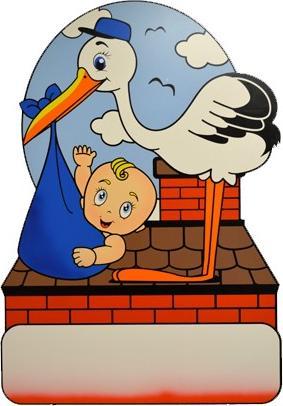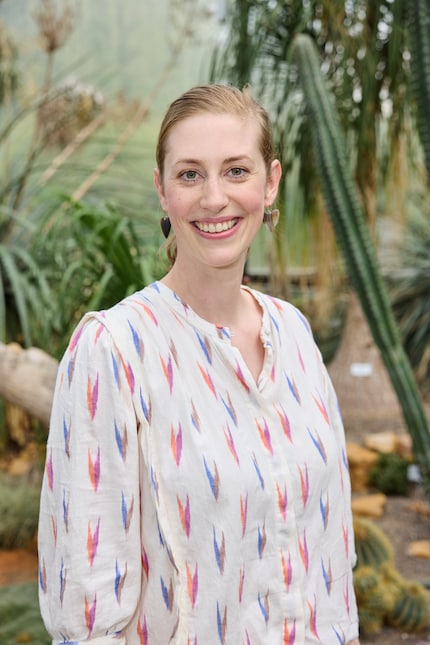

Baby name consultant: «People often ask me for gender-neutral names»
Naming your newborn baby is a life decision you’ll have to think long and hard about. As a baby name consultant, Andrea Horka helps would-be parents do exactly that. In this interview, we discuss the trends, pitfalls and wonderful moments associated with finding the perfect name for a child.
Naming a child is a big moment. An experience you’ll go through once, twice or maybe three times in life, making history in the process. Well, family history at least. Still, one thing’s for certain. One day, your child, who’ll breathe life into their given name and make it their own, will be standing in front of you, asking you, «why?» Why that name in particular? And the response will be just as unique as the human being who answers to the name.
For one or two families, however, the name «Andrea Horka» is likely to come up in their explanations. She’s a Zurich native who helps parents-to-be choose baby names at babynamenconsulting.ch (website in German). Having been completely unaware that such a job existed, I was keen to set up an interview to hear more about it.

Source: Michael Sonderegger
Your name is Andrea, mine is Michael. When babies of our generation were born, there wasn’t yet a massive choice of common names available. When did you start looking into what other options might be out there?
**Andrea Horka, baby name consultant: **Obviously, as an Andrea, there were always loads of other people with the same name as me. But funnily enough, I actually developed an interest in names when I was a teen. Despite not even knowing if I wanted kids, I’d make lists of baby names and discuss them with my mates on the way to school (laughs).
These days, would-be parents have the world at their fingertips when choosing a name. You don’t have to name your kid after their grandad anymore. Nor do you have to take a name from a country that speaks your language. Do people come to you because they’re spoilt for choice?
I think it’s that parents often disagree. Sometimes, it’s good to be able to consult a neutral person outside of the family structure, who has no preference for one side or the other. And new names might come to the fore as a result. I always think it’s a shame when one parent has to compromise. Coming up with a name that everybody’s happy with is much nicer.
How do you go about advising people on choosing a name? I mean, it’s a really personal question, isn’t it? And everyone has different tastes.
I send parents a form containing lots of questions, and they decide which ones they want to answer. Most of them fill out the whole thing. The more I know, the more I can personalise their list of suggested names. It makes things more fun, too.
What kind of questions do you ask?
I need to know what direction they want to go in, and whether there are any names they definitely don’t want. I also have to find out if any names are already taken by relatives or friends. Obviously, it’s also important to know what the child’s surname will be to avoid any issues with the initials. And if they have siblings already, their name should be in keeping with that style. You often find a name for your first child, then have real difficulty naming your second or third.

I imagine you probably need to build up a good relationship with your clients first.
Yeah, my job gives me an insight into a really intimate moment. In many cases, people don’t tell anyone what they’ll be naming their child until after the birth. Doing that allows you to make the decision for yourself, which I also think is a good idea.
Have couples ever come to you looking delighted over their choice of name, and you’ve thought, ‘Help! I’ve got to talk them out of this’?
No, there haven’t been any times where I’ve thought, ‘That name doesn’t work at all’. I’d only think that if the name would be damaging to the child. Anything else is just a question of taste.
When might a child suffer as a result of their name?
For example, if their name’s problematic when read backwards. Lana is the most notorious example of that. Sooner or later, kids test out what their name would be backwards, which can be an issue at school. Even if the name would otherwise be really nice. A name can also be problematic if it’s linked to a dubious historical figure.
How important is it for a first name to mesh well with a surname? Sometimes, when somebody’s first and last names conjure up two totally different images in my head, I can’t help grinning. Say, their first name sounds like «flamenco» and their surname sounds like «Emmental». Can that ever work?
We’re getting better and better at that. There are so many international families out there who want their child’s name to bring different cultures and languages together. I think we’ve become much more open in that respect, and that’s great. Even if people are sometimes initially unsure of how a name is pronounced when they see it written down.
Am I right in thinking that it’s no longer that important to be able to determine a child’s gender on the basis of their name?
Absolutely! That mirrors what’s happening in society – it’s no longer a problem if a child’s gender isn’t immediately apparent from their name. In fact, people often ask me for gender-neutral names. That’s what they want. At the moment, English-speaking countries tend to use gender-neutral names more often. In Switzerland, most names are clearly male or female. But that distinction will eventually become less rigid.
You hear about girls in the US being named after male relatives, sometimes in a slightly modified form.
Yes, that’s true. There are girls called James and boys called Rose, for example. The US is a step ahead of us in that respect. If there’s any uncertainty, people simply ask for the person’s pronouns and how their name’s pronounced, and that’s the issue settled.
What regulations do we have around names? Which names aren’t allowed?
The local registry office has the final say on that. If they reject a name, the decision can also be challenged in court. Personally, I don’t know of any names that have been rejected. You just can’t give your child a name that’ll cause them harm.
What do you think about giving children middle names? If you do that, they’ll have multiple options if they eventually get tired of their first name…
I think it’s quite nice. A lot of families use middle names to honour a relative. On the other hand, people still rarely use their middle names in day-to-day life.
What do people find most important when looking for a name? The sound? The meaning? Or something else entirely?
Most parents look for that sweet spot between familiar and unusual, unique but easy to pronounce. A lot of people prefer not to go for one of the top ten most popular first names.

Das einzige Buch, das Du lesen solltest, bevor Du Deinem Kind einen Namen gibst
German, Life & education, 2024
The most popular first names are short and snappy. Noah, Liam and Matteo were the top boys’ names in Switzerland in 2023. Mia, Emma and Sofia were the most frequently chosen girls’ names.
I mean, those are all pretty names. I think that if you like a name, these lists shouldn’t matter and you should go for it anyway. And besides, the top ten list will always depend on the geographical area you’re looking at. Was the list compiled in Zurich? German-speaking Switzerland? These names differ drastically depending on the stats. Plus, there’s generally so much variety that you won’t need to worry about your child sharing a name with several of their classmates.
The names I just mentioned have been dominating the leaderboards for a while now. Have you spotted any new trends?
Basically, nature-themed baby names are on the rise. For example, Rio for boys and Celeste or Luna for girls. Aside from that, gender-neutral names and new combinations are trendy too. It’s no longer the case that names are recycled every 50 years.
But you do still get traditional names, don’t you?
Traditional names, such as Oskar or Konstantin, are still in demand for boys. Girls’ names, on the other hand, tend to involve new combinations these days. The suffix -lea is popular, and can be used to create names such as Solea or Malea. Combinations involving -eva or -lia are also seen as aesthetic right now. Silia, Felia or Mileva, for example.
These names are all short, and work in various countries. Do people often take the international side of things into consideration?
Definitely. That’s one of my customers’ top criteria. This next generation is very international; many families speak different languages and come from different countries. So, it’s definitely good if as many people as possible can pronounce the child’s name correctly, in the way their parents intended.
When do you feel satisfied with the service you’ve provided? What do you consider success?
When parents say I’ve given them some new inspiration. I think it’s lovely when parents find a name they’re both one hundred per cent happy with.
Simple writer and dad of two who likes to be on the move, wading through everyday family life. Juggling several balls, I'll occasionally drop one. It could be a ball, or a remark. Or both.
Interesting facts about products, behind-the-scenes looks at manufacturers and deep-dives on interesting people.
Show allThese articles might also interest you

Background information
5 good reasons to start the year with sports for all the family
by Michael Restin

Background information
What should I say? How to say the right thing to friends in tough times
by Mareike Steger

Background information
When your child loses the game – and their temper along with it
by Martin Rupf